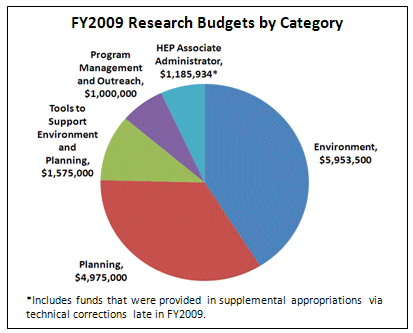2009 Annual Report
Contents
The Federal Highway Administration (FHWA) Office of Planning, Environment and Realty's (HEP) Surface Transportation Environment and Planning Cooperative Research Program (STEP) ended on September 30, 2012. For current HEP research information, please see HEP's research web site.
 |
*Includes funds that were provided in supplemental apprpriations via technical corrections late in FY 2009.
Figure 1: FY2009 Research Budgets by Category |
Since 2006, the Federal Highway Administration (FHWA) has administered the Surface Transportation Environment and Planning Cooperative Research Program (STEP) to encourage new, strategic, and applied research on the relationship between surface transportation planning and the environment. Federal, State, and other stakeholders are involved throughout the STEP process to shape, refine, and implement research agendas.
Funding
Section 5207 of the Safe, Accountable, Flexible Efficient Transportation Equity Act: A Legacy for Users (SAFETEA-LU) established the STEP program for 2006-2009. SAFETEA-LU authorized $16.875 million annually to implement the STEP. After adjusting for obligation limitations, rescissions, and the over-designation of Title V Research in SAFETEA-LU, $14.5 million was available for the FY2009 STEP.
FY2009 STEP Accomplishments
- FHWA improved the state of the practice in planning, environment, and realty through investment in 67 projects identified in the FY2009 STEP Research Plan that fall into three broad research categories: environment, planning, and tools to support environment and planning (see figure).
- STEP continued to be a model for stakeholder collaboration, outreach, and feedback. Using a Web-based system, stakeholders provided over 400 pieces of feedback on research needs during the FY2009 comment period between June 23 and September 22, 2008. Stakeholders also directly participated in prioritizing research needs through meetings and study reviews.
- FHWA addressed questions and concerns about how air quality and climate change impacts transportation, including evaluating transportation-related strategies to address greenhouse gas emissions.
- FHWA enhanced transportation demand management through improvements in travel modeling tools, peer program events, and research on geographic information systems.
- FHWA built professional capacity in planning and environment through outreach and training.
Impacts
- The STEP process has allowed FHWA to build partnerships that encourage collaboration, leverage diverse funding sources, and offer a fresh perspective on emerging research topics.
- Through the STEP, stakeholders have engaged in the development and implementation of projects, exchanged information on initiatives, and shared lessons learned about research findings, critical success factors, and effective practices.
STEP is the primary source of SAFETEA-LU funding for FHWA research on planning and the environment.
Visit www.fhwa.dot.gov/hep/step/
